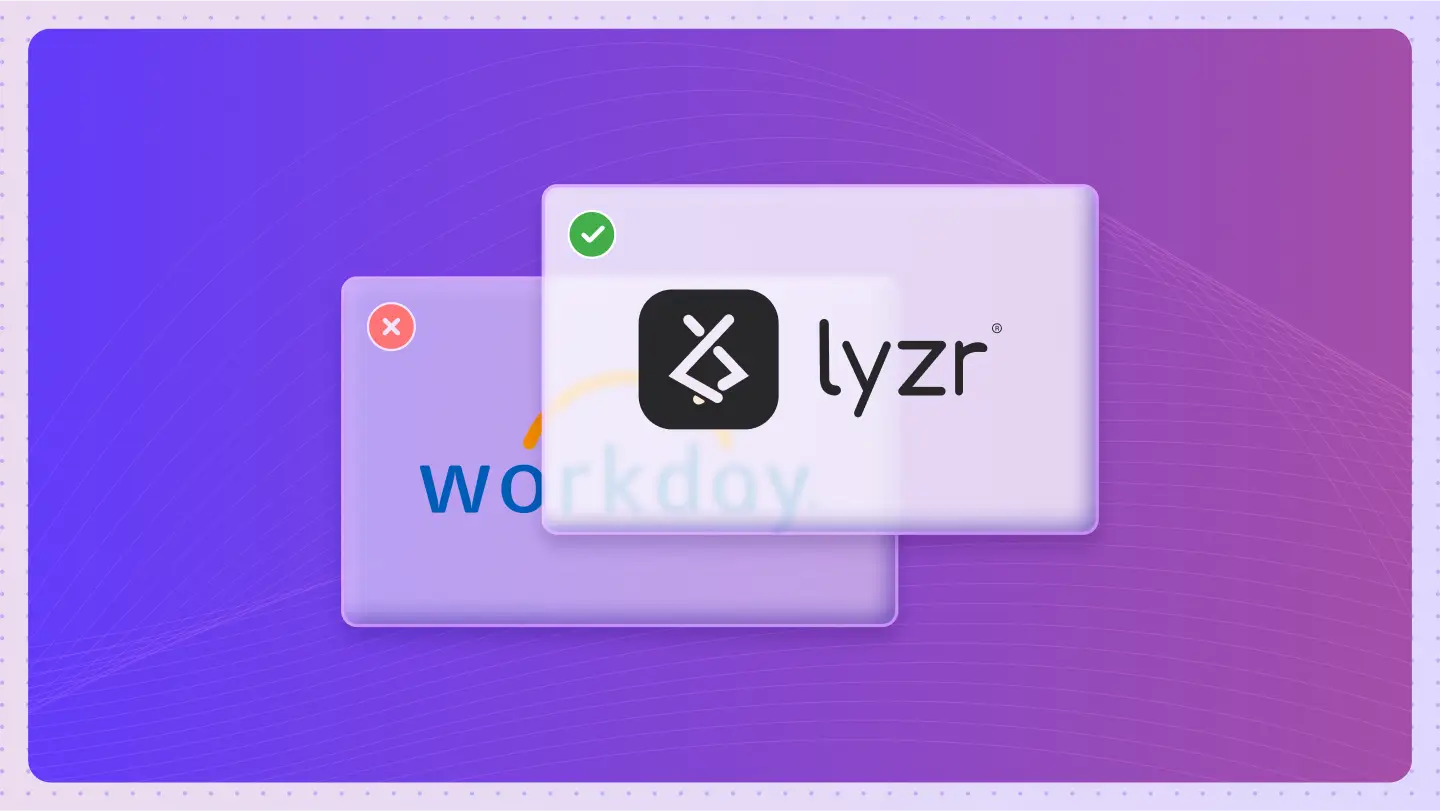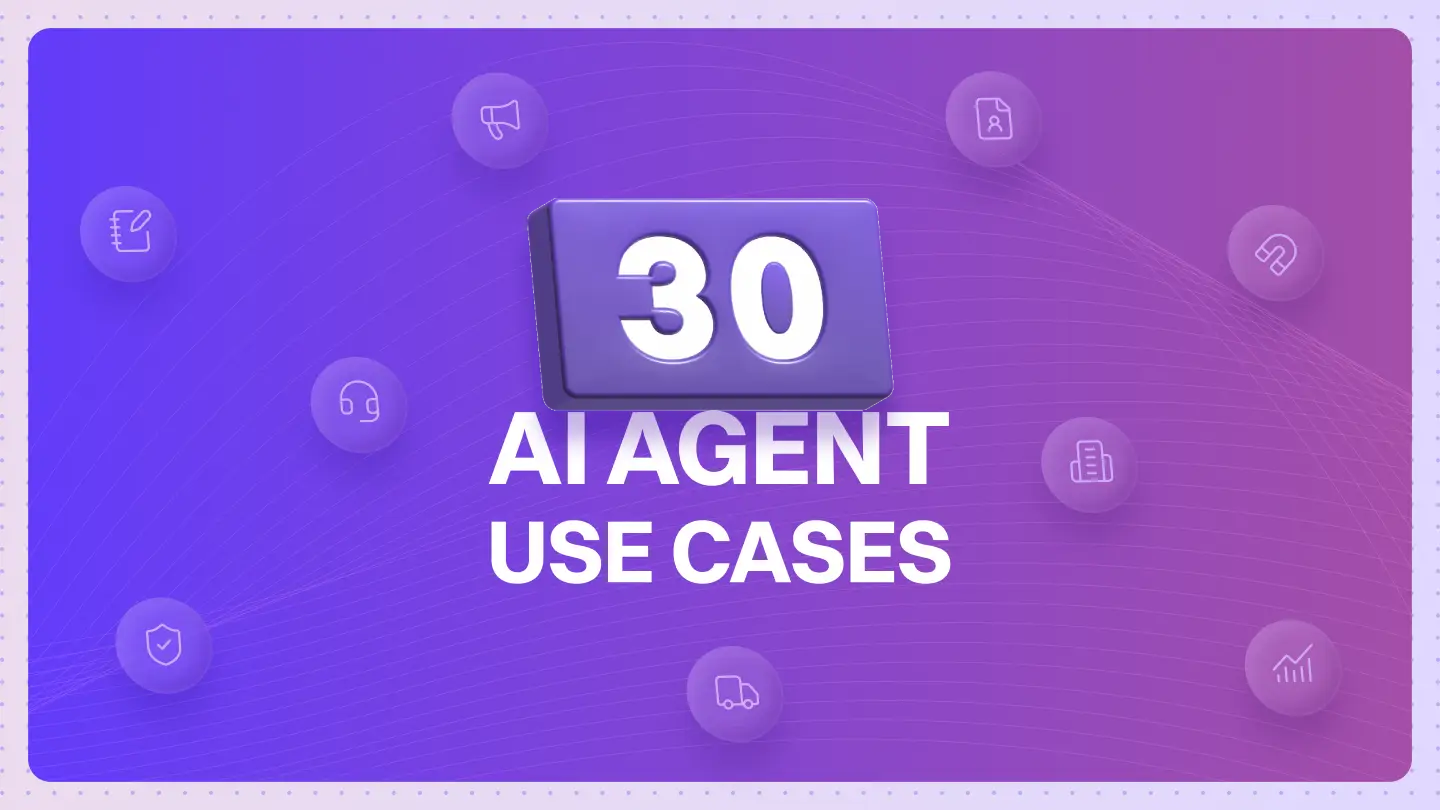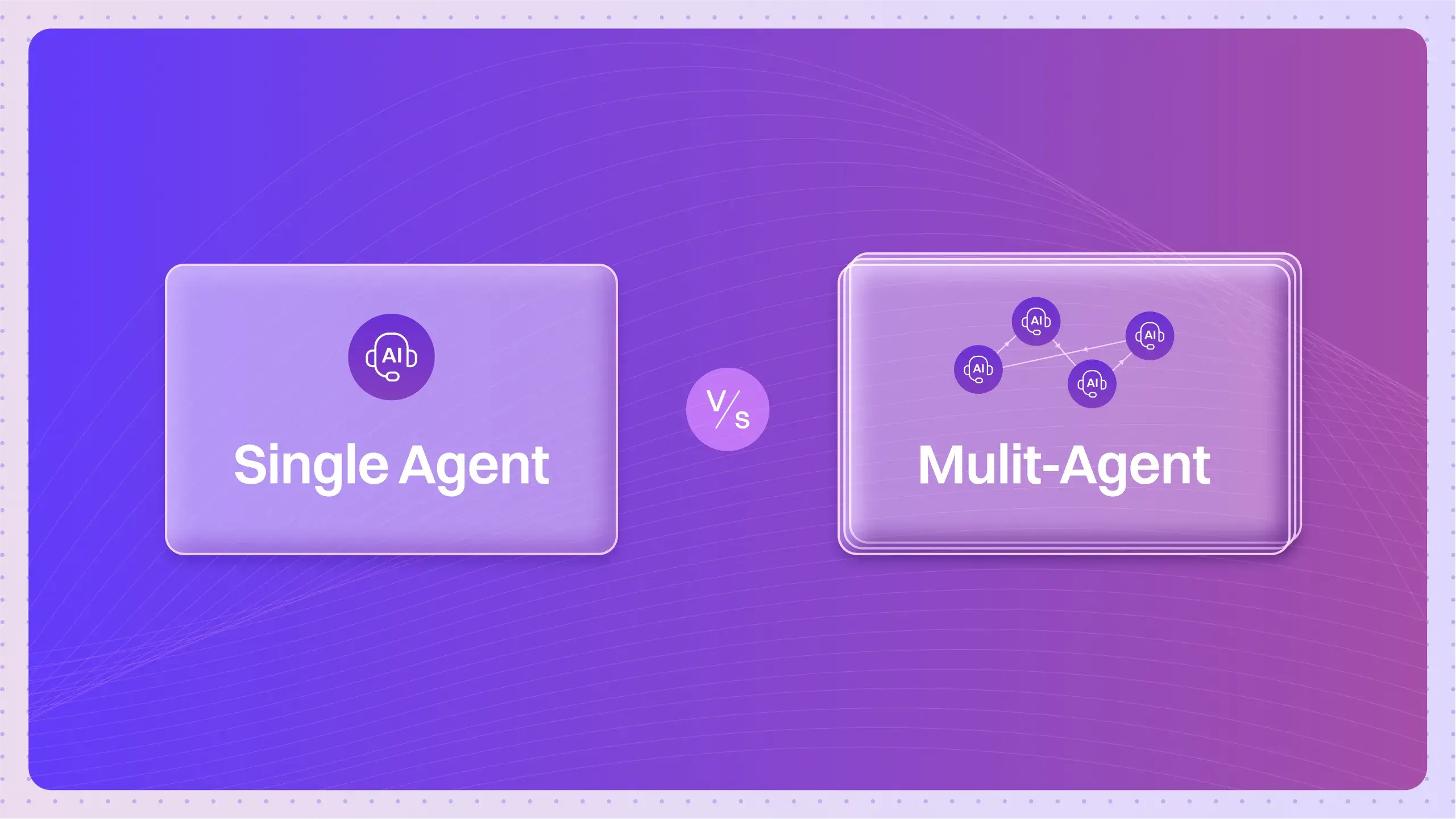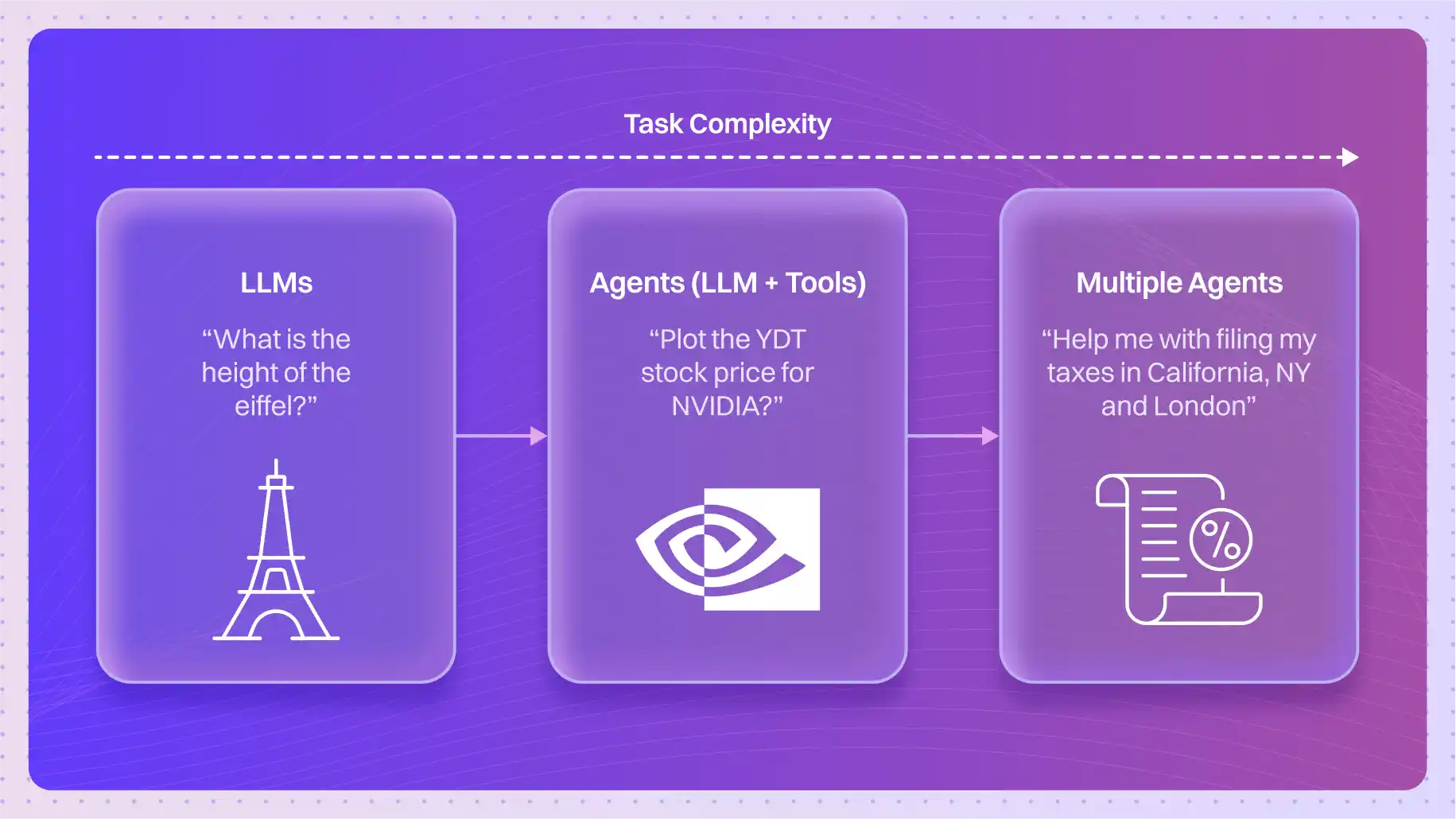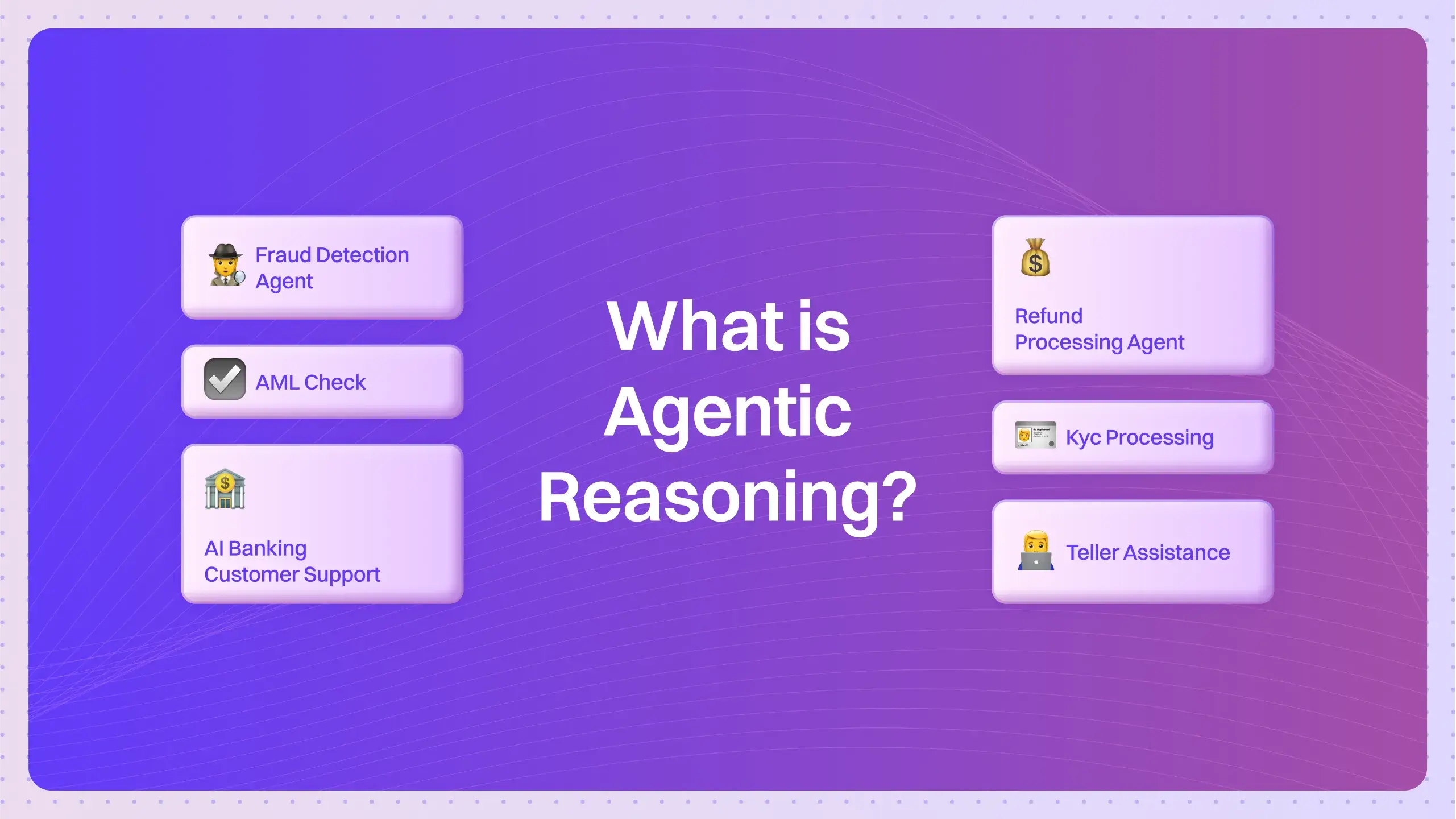Table of Contents
ToggleHey there.
If you’ve landed here, chances are you’ve been wondering What AI Agents are, What is their impact and What can we do with them? To understand their impact, we need to look at the massive scale of their adoption.
It’s pretty wild what’s happening right now. The whole way we do business is being transformed by AI agents. If you want to know how big this is, then let me tell you, the market is projected to rocket from $5.4 billion to a staggering $236 billion in a decade.
It’s a complete gold rush. Organizations are rushing to adopt these tools because they can work autonomously, solve problems, and learn from what they do, which is a total revolution.
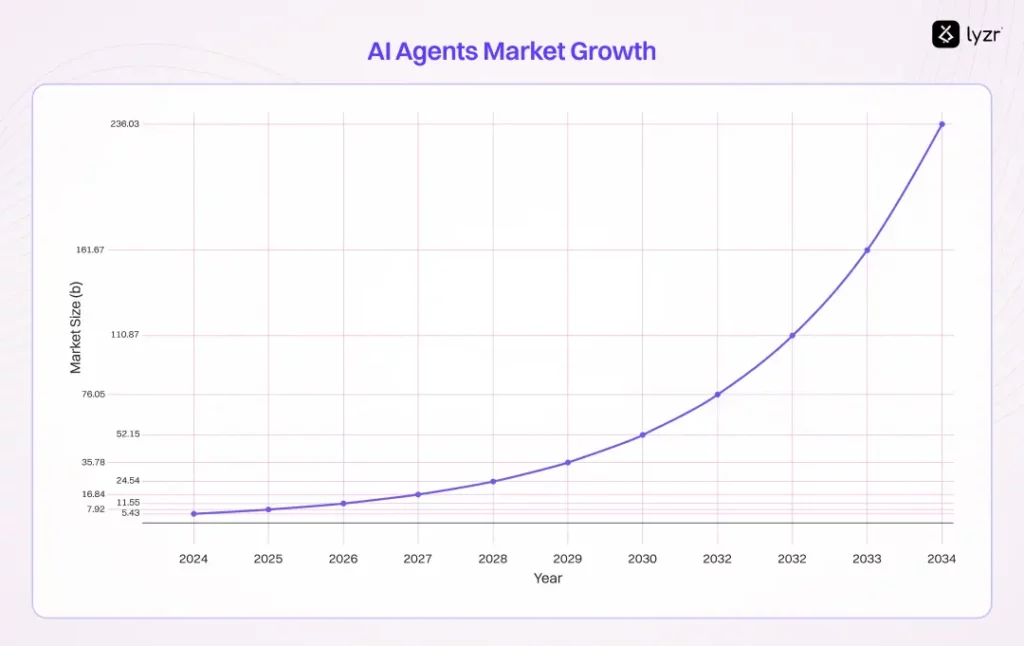
The simplest way to think about it is that AI agents are a huge leap forward. Your classic automation just follows a rigid script, like a macro in a spreadsheet. These new agents are different. They can sift through massive amounts of information, understand what’s going on, and adapt in real time. They’re essentially combining different types of AI to give you human-level thinking at computer-level speed.
This explains why there’s so much pressure for businesses to get on board. The reality is, about 72% of companies are already using AI, and they’re seeing real results, expecting a profit boost of around 38% this year alone. It has shifted from a ‘nice-to-have’ to a ‘need-to-have’ to stay in the game. When 8 out of 10 leaders believe any decision can be automated, it’s not just about competition anymore; it’s about survival.
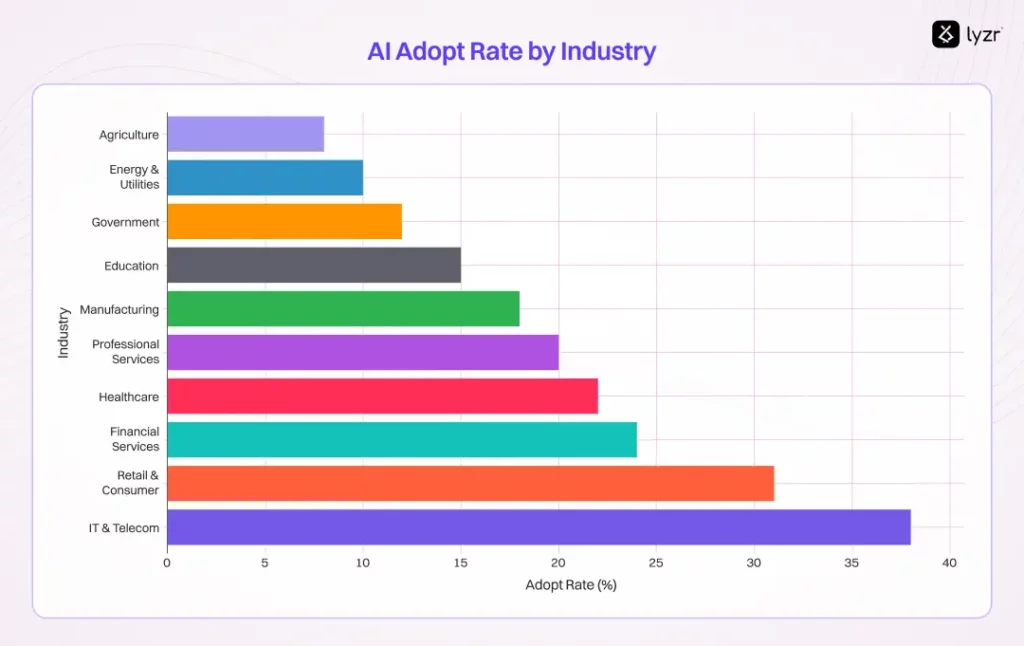
The Critical Need for AI-Driven Automation
Let’s be honest, businesses today are dealing with a perfect storm. It feels like they’re being hit from all sides: there aren’t enough people for the jobs, costs are going through the roof, and everyone is drowning in more data than they know what to do with.
The pandemic kicked all of this into high gear, forcing everyone to adapt quickly. We saw the consequences almost immediately, like that massive 149% spike in online fraud back in early 2021. That was a huge wake-up call that the old ways of doing things just can’t keep up anymore.
This is exactly where AI agents come in. To give you a real sense of what they can do, we’ll explore 30 different ways they’re being used right now and believe me, it’s just scratching the surface.
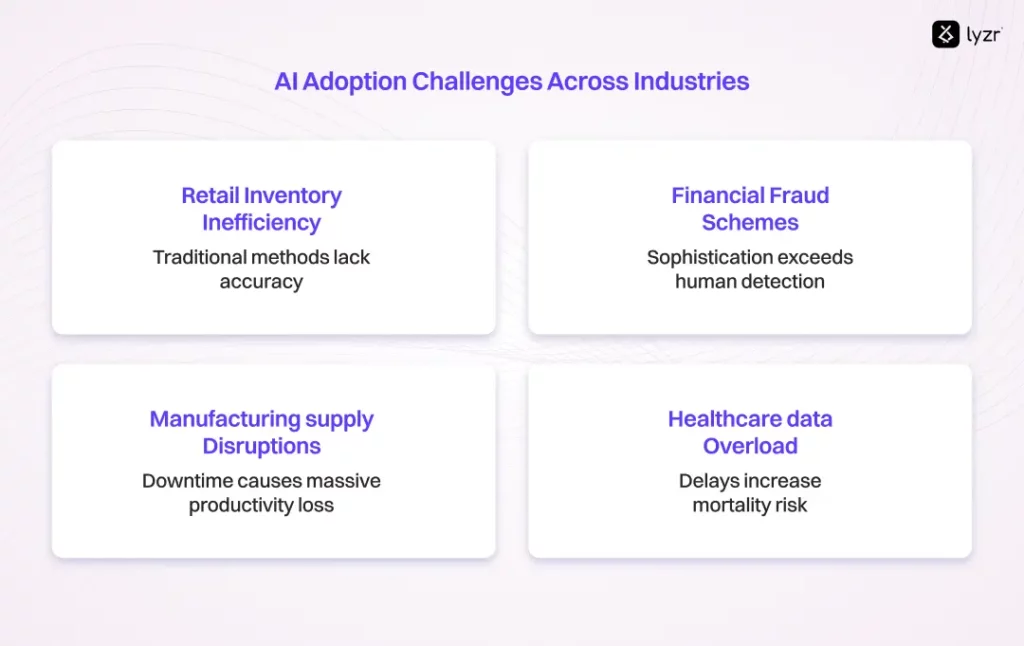
So, where are these pressures hitting the hardest? You can see it happening in some of the most important parts of our economy:
In Healthcare, hospitals are drowning in patient data, which can lead to dangerous delays. For a critical condition like sepsis, every single hour that passes without treatment can be a matter of life and death.
In Manufacturing, a single broken machine or a supply chain snag can bring an entire factory to a standstill, costing a company millions for every hour of lost work.
In the Financial world, it’s a constant, high-stakes battle against clever fraud schemes that drain billions from the global economy. These attacks are happening too fast and too often for human teams to keep up.
And in Retail, it’s the classic problem of not knowing what’s actually on the shelf. Old inventory methods are often wrong, while AI can provide near-perfect accuracy, the difference between a happy customer and a lost sale.
When you look at all these issues together, it’s clear that AI agents aren’t just a ‘nice-to-have’ technology anymore. They’re becoming essential for businesses to stay afloat and grow.
The Transformative Impact of AI Agents
So, what’s the actual payoff when a company brings AI agents on board? It really boils down to three huge benefits: they help teams work faster(efficiency), they save a ton of money(cost optimization), and they can handle massive amounts of work without breaking a sweat(Scalability).
The numbers we’re seeing are pretty serious. Companies are cutting their costs by anywhere from 20% to 70% and are becoming up to 40% more productive. The most advanced teams are using AI to make decisions nearly 44% faster and improve the quality of their work by almost 48%.
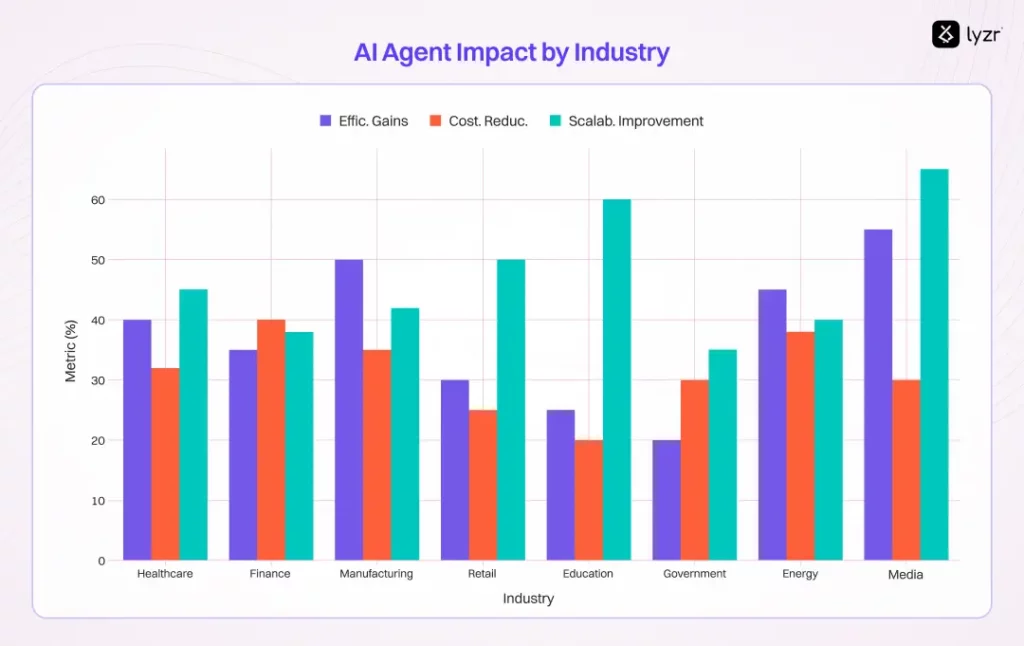
1. Efficiency Revolution
AI Agents can process information way faster than any human ever could. For instance, Google’s DeepMind looked at all the data from sensors in its data centers and figured out how to adjust the cooling systems perfectly.
As a result, they slashed their cooling costs by a massive 40%. It’s also about being smart and predictive. AI can spot when a piece of equipment is about to fail before it happens, which is a huge deal, potentially saving businesses worldwide between $0.5 to $0.7 trillion.
2. Cost Optimization Breakthrough
The financial benefits go way beyond just replacing manual tasks. In manufacturing, companies using industrial AI to manage their supply chains are getting 30-50% more efficient, with some tasks now happening 10 times faster. It’s not just about speed, but also about smarter resource use.
One pharmaceutical company, for example, cut its infrastructure costs by an incredible 74% by switching to AI platforms. Even banks are seeing the difference, HSBC used AI to monitor 1.35 billion transactions and got 2-4% better at catching financial crime, which saves money and reduces risk.
3. Scalability
This might be the biggest advantage of all. Scalability is the ability to handle huge spikes in work without slowing down. Imagine an online store during a massive flash sale. Instead of the website crashing, AI agents can instantly multiply to handle millions of orders and customer service questions at once. When the sale is over, they scale back down.
This allows businesses to seize huge opportunities without the massive cost of hiring and training a temporary army of people.
Having established what AI agents are, their potential impact, and the strategic gaps they fill, we will now examine their use cases in greater detail.
Industry-by-Industry Breakdown: 30 Revolutionary Use Cases
Healthcare & Life Sciences
Healthcare stands at the forefront of AI agent transformation, addressing critical challenges in patient care, operational efficiency, and medical research.
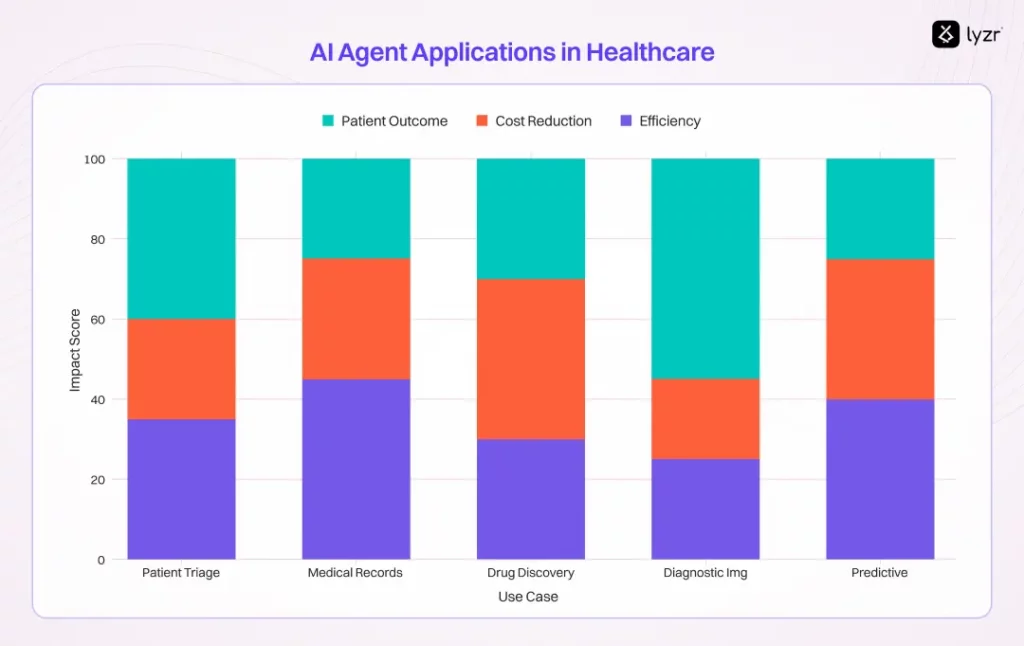
Healthcare AI Agent Applications: Impact Analysis
- AI Agent Use Case: Intelligent Patient Triage & Emergency Response
AI triage agents autonomously analyze patient symptoms and medical data in real-time to prioritize care pathways. These agents instantly assess risk levels, notify clinical teams for time-sensitive cases, and ensure immediate attention for critical patients. The agents continuously scan and prioritize incoming cases based on clinical findings, enabling healthcare professionals to address high-priority cases faster and improve patient outcomes. - Automated Medical Record Processing & Documentation
AI documentation agents autonomously process vast amounts of patient data, extracting relevant information from electronic health records, lab results, and imaging studies to create comprehensive patient summaries. These agents reduce the time clinicians spend on documentation by up to 60%, allowing healthcare professionals to focus more on direct patient care. - Pharmaceutical Research & Drug Discovery Acceleration
AI research agents autonomously analyze molecular structures, predict drug interactions, and identify potential therapeutic compounds. These agents reduce drug discovery timelines from 10-15 years to 3-5 years while significantly lowering development costs by continuously processing vast datasets and identifying promising compounds. - Autonomous Medical Imaging Analysis & Diagnostics
AI diagnostic agents autonomously detect abnormalities in medical imaging with superior accuracy to human radiologists. These agents analyze mammograms, pathology images, and other scans to identify conditions like breast cancer and lymph node metastases with exceptional precision, providing consistent accuracy regardless of human fatigue or oversight challenges. - Predictive Health Monitoring & Risk Assessment
AI predictive agents autonomously analyze patient data to forecast disease progression, identify at-risk populations, and recommend preventive interventions. These agents forecast healing trajectories for wound management and enable clinicians to optimize treatment plans and improve outcomes through continuous monitoring and early intervention strategies.
Finance & Banking
The financial sector leverages AI agents to combat fraud, ensure compliance, and enhance customer experiences while managing risk at unprecedented scales.
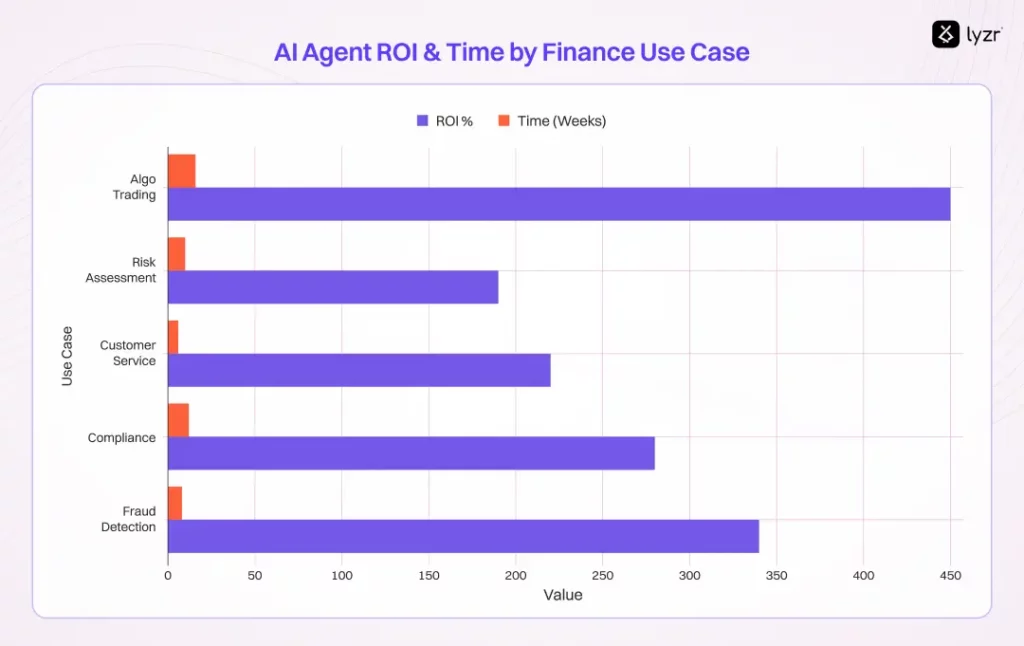
Finance AI Agent ROI vs Implementation Timeline
6. Real-Time Fraud Detection Systems
Modern banking AI agents monitor 1.35 billion transactions across over 40 million customer accounts at HSBC alone. These systems analyze transaction patterns, user behavior, and contextual data to flag suspicious activities in milliseconds. Machine learning algorithms self-learn by processing historical data and continuously adapt to evolving fraud patterns, achieving detection rates that surpass traditional rule-based systems.
7. Automated Compliance Monitoring
AI agents continuously scan regulatory requirements, internal policies, and transaction data to ensure compliance. These systems automatically generate reports, flag potential violations, and provide real-time guidance to financial professionals, reducing compliance costs by up to 40%.
8. Intelligent Customer Service
Banking chatbots powered by advanced AI provide 24/7 customer support, handling routine inquiries, account management, and basic financial advice. These agents can resolve 80% of customer queries without human intervention, significantly reducing operational costs while improving response times.
9. Risk Assessment Automation
AI agents analyze borrower profiles, market conditions, and economic indicators to provide real-time risk assessments for lending decisions. These systems can process loan applications in minutes rather than days, while maintaining higher accuracy in default prediction.
10. Algorithmic Trading Optimization
Sophisticated AI agents execute trades based on market analysis, news sentiment, and technical indicators. These systems can process millions of data points per second to identify trading opportunities and execute transactions at optimal prices.
Retail & E-commerce
Retail AI agents transform customer experiences, optimize inventory management, and drive personalized commerce at scale.
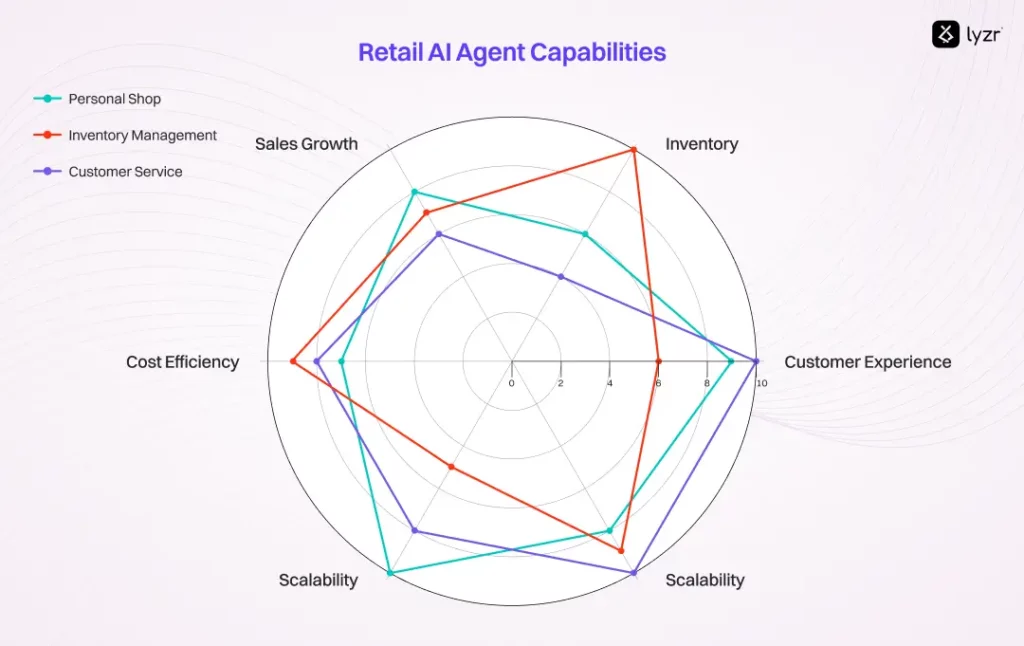
1. Hyper-Personalized Shopping Assistants
Leading retailers like Zara, H&M, Nike, and Swarovski use AI-powered recommendations that analyze browsing history, past purchases, and social media interactions to deliver real-time personalized suggestions. Swarovski’s AI-driven product recommendations account for 10% of website sales, demonstrating the tangible business impact.
2. Intelligent Inventory Management
AI agents improve inventory accuracy from 63% to 95% while achieving 99.5% fulfillment accuracy. These systems analyze real-time sales data, seasonal patterns, and market trends to optimize stock levels, reducing carrying costs by 25% while improving demand forecasting accuracy to 98%.
3. Dynamic Pricing Optimization
AI agents continuously monitor competitor pricing, demand patterns, and market conditions to automatically adjust prices for maximum revenue optimization. During 2024 Black Friday weekend, retailers using AI-driven chatbots reported a 15% increase in conversion rates.
4. Customer Service Automation
Retail AI chatbots handle product inquiries, order tracking, returns processing, and technical support. These systems can reduce manual work by 80% through automated content generation and publishing, while maintaining brand consistency across multiple channels.
5. Supply Chain Optimization
AI agents coordinate with suppliers, predict demand fluctuations, and optimize logistics networks. Manufacturing executives report 53% increased revenues as a direct result of introducing AI in supply chain management, with more than one-third experiencing revenue increases exceeding 5%.
Education & Research
Educational AI agents personalize learning experiences, automate administrative tasks, and accelerate research discovery.
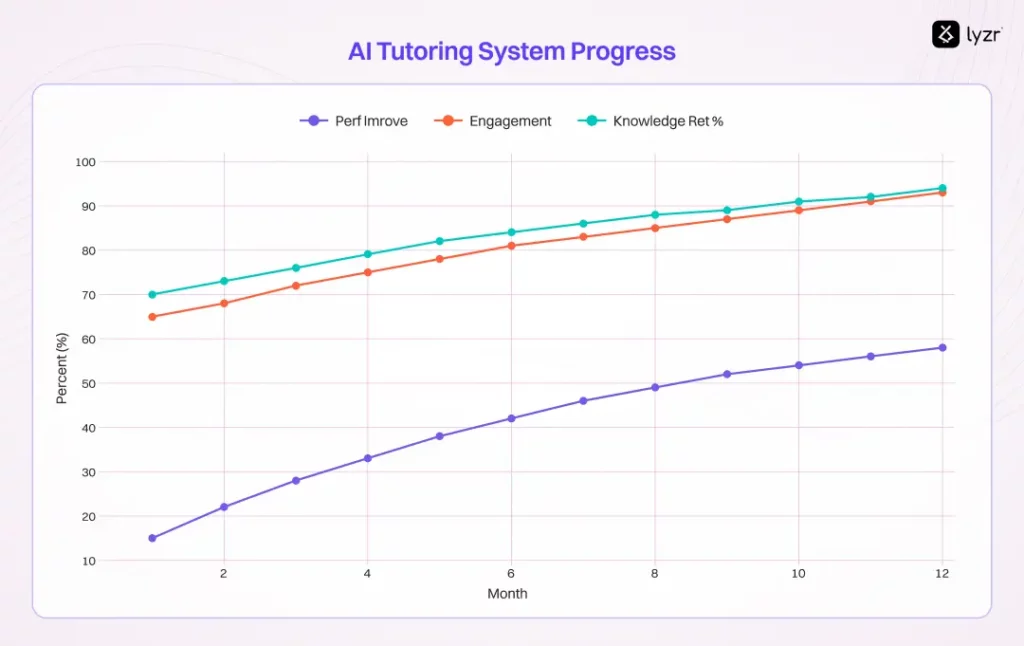
1.Intelligent Tutoring Systems
AI tutoring platforms like DreamBox adapt lessons to individual student needs, ensuring each student receives instruction at the appropriate difficulty level. Knewton’s platform analyzes millions of data points to determine optimal learning paths, while Smart Sparrow offers adaptive eLearning that responds to student interactions in real-time.
2. Automated Grading and Assessment
AI agents evaluate student assignments, provide detailed feedback, and track learning progress. These systems can handle objective assessments instantly while providing consistent grading standards across large student populations.
3. Research Paper Summarization
Academic AI agents process vast literature databases, extract key findings, and generate comprehensive research summaries, helping students manage complex subjects such as statistics, where requests like do my statistics homework for me reflect the need for clearer guidance alongside automated tools.
4. Adaptive Learning Platforms
Educational AI agents continuously assess student performance and adjust curriculum difficulty, pacing, and content delivery methods to optimize individual learning outcomes. Studies show these systems can improve student retention rates by up to 30%.
5. Administrative Automation
AI agents handle student enrollment, scheduling, grade processing, and communication workflows. Universities report 40% reduction in administrative processing time while improving accuracy and student satisfaction.
Manufacturing & Supply Chain
Manufacturing AI agents optimize production processes, predict maintenance needs, and coordinate complex supply networks.
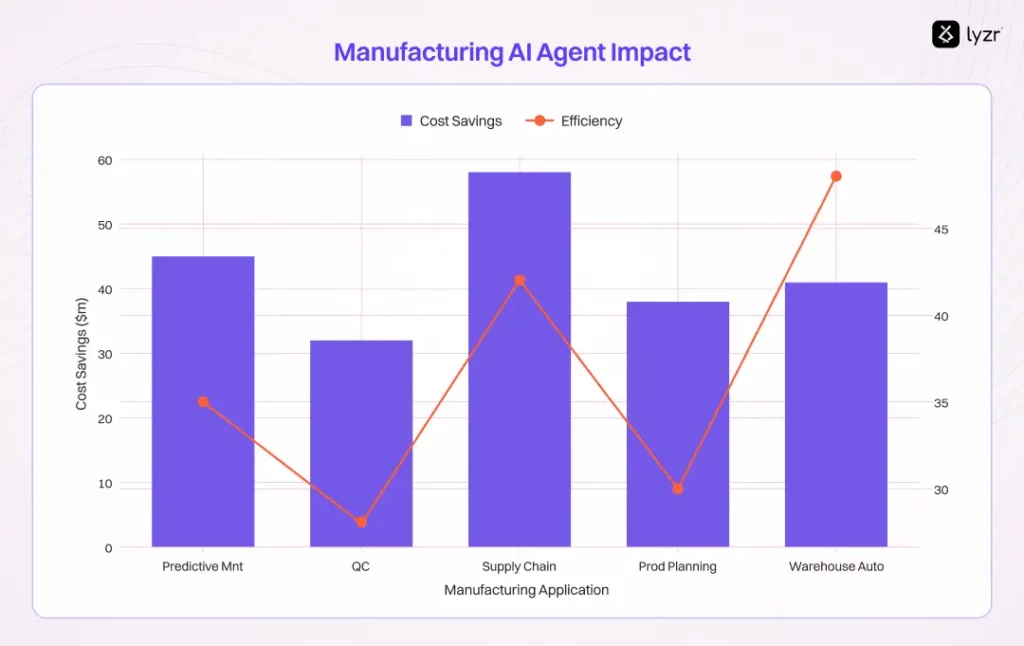
Manufacturing AI Agent Impact: Cost Savings vs Efficiency
1. Predictive Maintenance Systems
Manufacturing AI agents analyze sensor data from critical equipment to detect early signs of potential failures. McKinsey reports predictive maintenance generates $0.5 to $0.7 trillion in potential value globally, while companies like Pampa Energy use algorithms to detect gas turbine compressor anomalies before catastrophic failure.
2. Quality Control Automation
AI-powered vision systems identify defects, misaligned parts, and missing components with minimal human error. Car manufacturers use sensor data to monitor welding gun conditions, triggering alerts as thresholds are approached to prevent production delays
3. Supply Chain Orchestration
AI agents analyze traffic, weather conditions, and delivery schedules to recommend alternative shipping routes, reducing delays and improving delivery times. Fleet management AI provides real-time insights for optimal delivery timing and route optimization.
4. Production Planning Optimization
Manufacturing AI agents coordinate production schedules, resource allocation, and inventory levels across multiple facilities. These systems can reduce production planning time by 60% while optimizing resource utilization and minimizing waste.
5. Warehouse Automation
AI agents control robotic systems, optimize picking routes, and manage inventory placement for maximum efficiency. Automated warehouse systems can achieve 40% higher productivity while reducing operational errors and improving worker safety.
Government & Public Services
Government AI agents streamline citizen services, enhance transparency, and improve policy implementation efficiency.
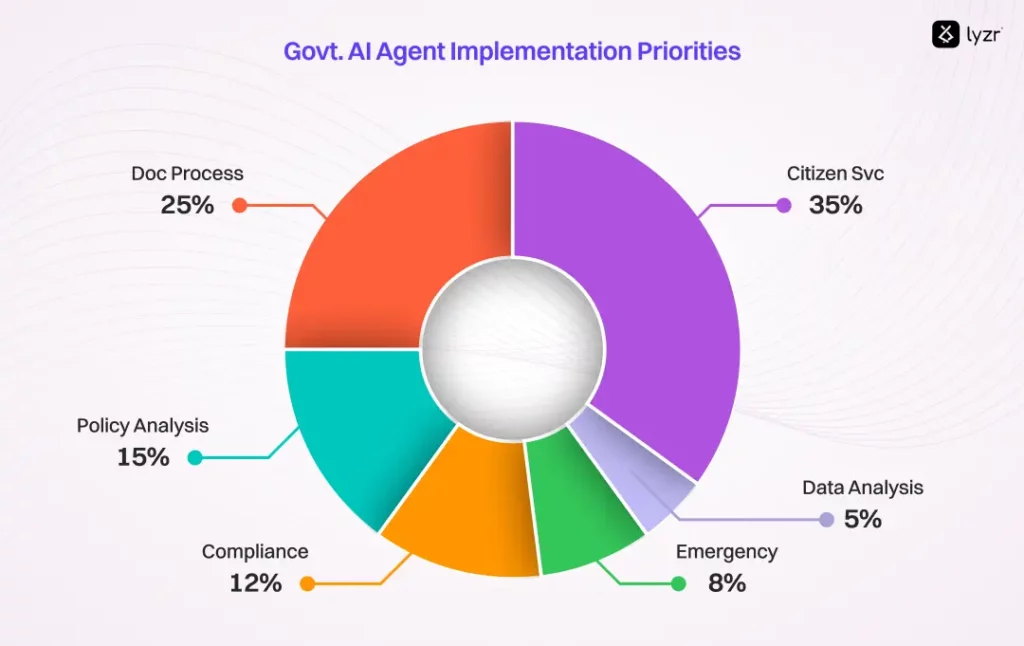
Government AI Agent Implementation Priorities
1. Citizen Query Automation
AI-powered chatbots handle routine government inquiries, provide service information, and guide citizens through application processes. These systems offer 24/7 availability, reducing wait times and improving citizen satisfaction while freeing government employees to focus on complex cases requiring human judgment.
2. Document Processing Automation
Government AI agents automate permit applications, license renewals, and regulatory compliance checking. AI systems can process applications more quickly and accurately, reducing administrative burden while improving the citizen experience through faster service delivery.
3. Policy Analysis and Compliance
AI agents analyze proposed legislation, assess regulatory impact, and monitor compliance across government agencies. These systems provide real-time updates and transparency while ensuring consistent policy implementation.
Energy & Environment
Energy sector AI agents optimize grid operations, integrate renewable sources, and advance environmental sustainability goals.
1. Smart Grid Optimization
AI agents analyze weather forecasts and energy demand to optimize renewable energy output, while managing energy storage devices to release power during peak demand periods. Google’s DeepMind reduced cooling energy usage by 40% in data centers through AI-powered optimization.
2. Environmental Monitoring and Compliance
AI agents track emissions, monitor environmental conditions, and ensure regulatory compliance. These systems can analyze satellite data, sensor networks, and historical patterns to predict environmental changes and recommend proactive measures.
Media & Creative Industries
Media AI agents accelerate content creation, analyze audience behavior, and scale creative workflows.
1. Media AI Agent Applications
AI-powered content generation systems automate blog writing, social media posts, and video editing workflows. Netflix’s recommendation engine analyzes viewing patterns to suggest personalized content, while content creation platforms reduce production time by 80% through automated editing and optimization.
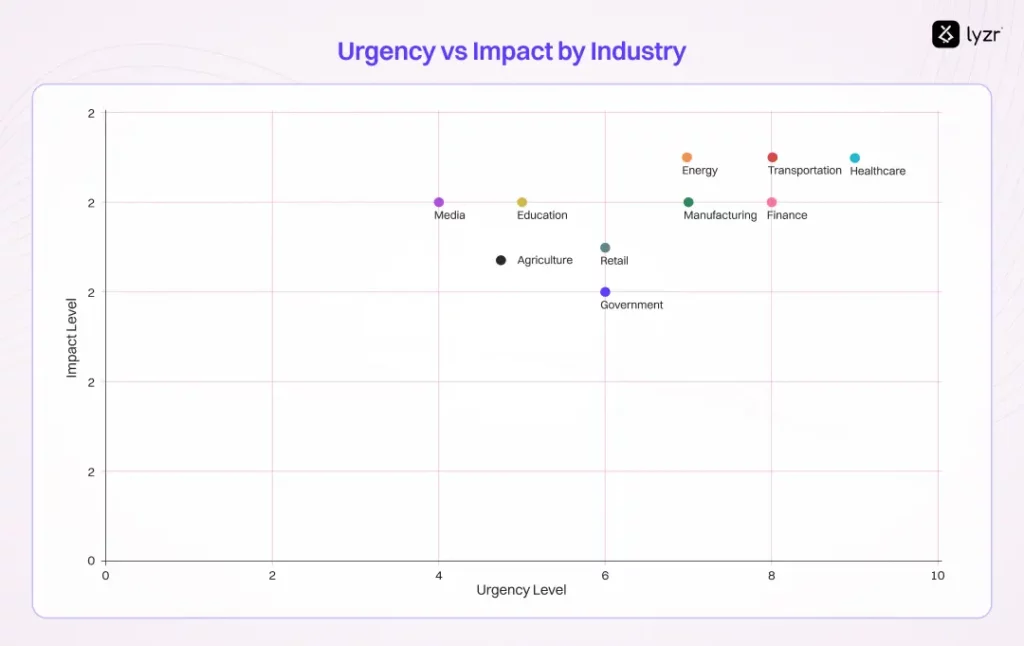
Explore Other AI Agent Use Cases
Comparative Analysis: Implementation Priorities
To figure out where AI agents can do the most good, it helps to think about two simple things: which problems are most urgent, and which areas have the biggest long-term potential?
When you look at it that way, a few industries clearly need help right away, while others are exciting, long-term investments for the future.
These are the industries facing immediate challenges where AI agents can make a huge difference today.
- Healthcare: The need to improve patient safety and make hospitals run more efficiently is critical. These are problems that can’t wait.
- Finance: With constant pressure to stop fraud and keep up with regulations, AI is essential for protecting people’s money and keeping the system secure.
- Charity organizations: AI agents can also power specialized nonprofit software to automate donor outreach, streamline grant application workflows, and personalize engagement at scale, helping organizations focus more on mission and less on administrative overhead.
- Manufacturing: We’ve all seen how easily supply chains can break down. AI is needed right now to smooth out those disruptions and help factories run smarter.
These are areas where AI agents could be completely revolutionary, but it will be more of a long-term project.
- Education: Imagine an AI tutor personalized for every single student. The potential to scale one-on-one learning is massive, but it’s a vision that will take time to get right.
- Energy: AI can help us build a smarter, more sustainable energy grid for the future. It’s a huge undertaking with a long-term payoff for the planet.
- Media: Think about AI helping with creative work or giving you a perfectly tailored stream of content. The opportunities to change how we create and consume media are enormous.
Future Outlook and Ethical Considerations
This whole AI agent revolution is a double-edged sword, it’s creating incredible opportunities alongside some serious challenges. The biggest change is coming to the workplace. It’s predicted that by 2028, 60% of companies will expect their employees to have basic AI skills.
This isn’t about replacing people. The real goal is to create partnerships where humans and AI work together, each making the other better at their job.
Before we get too far, there are some major ethical questions we have to answer:
Fairness: How can we build AI that makes fair decisions and doesn’t inherit our human biases?
Privacy: How do we protect sensitive data while still allowing AI to learn and improve?
Transparency: If an AI makes a call, we need to be able to understand its reasoning. It can’t be a “black box.”
Job Transitions: As AI handles more tasks, how can we responsibly support workers and create new, meaningful roles for them?
The future of AI is already taking shape with some mind-blowing ideas. We’re talking about linking AI with quantum computing, running AI directly on our devices (edge AI), and even creating networks where agents from different industries team up to solve huge problems.
The next wave of transformation is set to hit fields like agriculture, space tech, and cybersecurity, likely in ways that are even bigger than what we can imagine today. Ultimately, the organizations that will succeed are the ones that see AI as more than just a cost-cutting tool.
They’ll see it as a way to unlock human potential. The future belongs to those who can perfectly blend the power and speed of artificial intelligence with the things that make us human: our creativity, our empathy, and our strategic thinking.
Curious how you can start building AI Agents?? Start here
Book A Demo: Click Here
Join our Slack: Click Here
Link to our GitHub: Click Here

